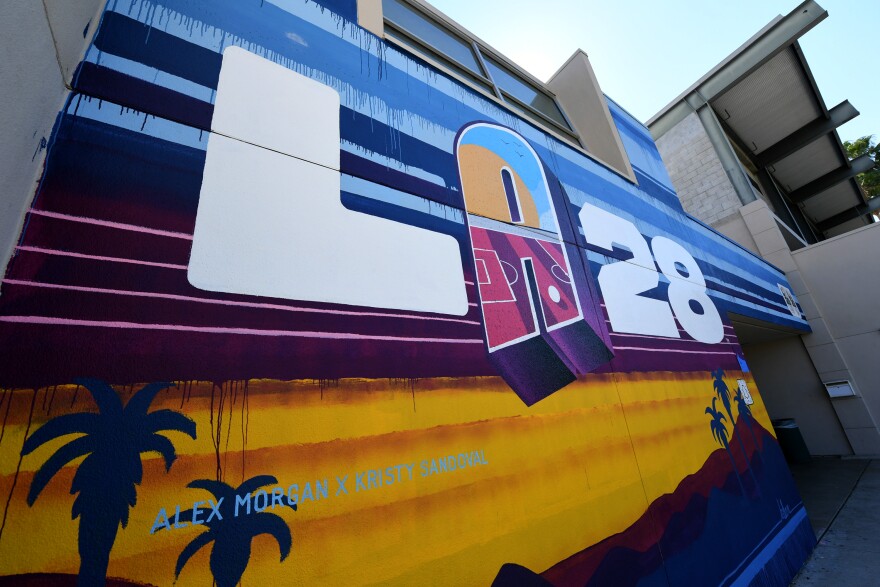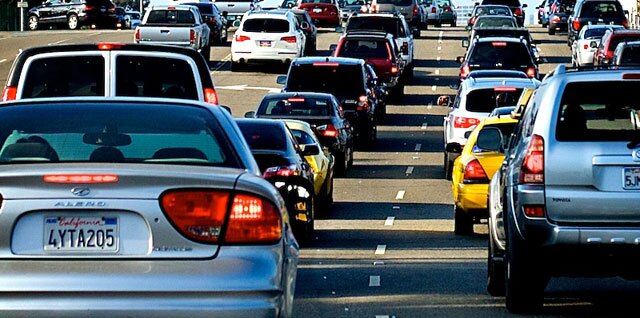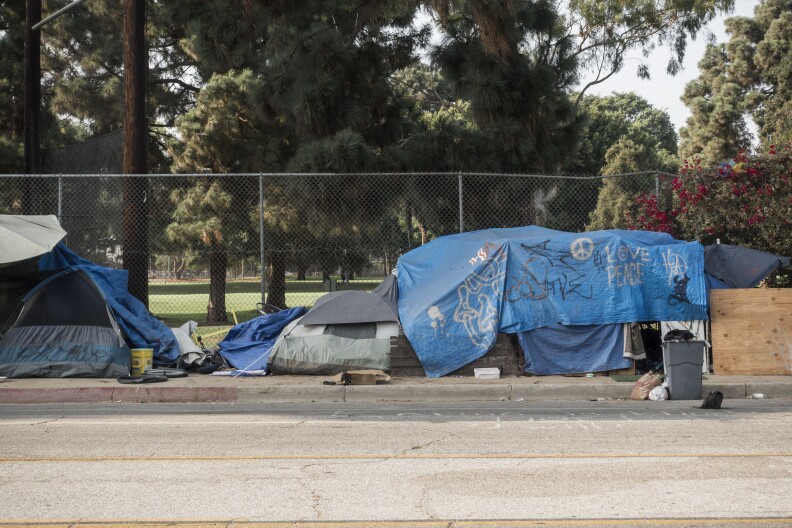From Overspending To Traffic Jams: How LA Will Deal With The 2028 Olympics

It took more than four years for the city to get down to the nitty-gritty details with LA28, the nonprofit whose formal name is the “Los Angeles Organizing Committee for the Olympic and Paralympic Games 2028.”
But on Wednesday, after months of negotiations, the contract was finally made public.
It's the document that dictates exactly what the city and taxpayer liability might be if the games lose money or run over budget. It also states lofty goals of achieving diversity, gender equity, sustainability and shared economic opportunity through the games.
The decision to bring the games to L.A was announced in August 2017, and a Memorandum of Understanding was created, giving the broad outlines of the relationship with the local organizing committee. No further details have been specified since then, until this contract. Once approved, it will replace the MOU.
The contract talks were delayed by the pandemic emerging in 2020, and this October, the committee blew past another expected contract release date, giving city staff until Nov. 1 to finalize the contract proposal. The deadline to execute the agreement has now been moved to Dec. 8.
Black Box
Over those years, the Olympics deal has been something of a black box, and that has made some local players — such as the hospitality union Unite HERE Local 11 and even some members of the City Council — uneasy about the impact the games might have on jobs, housing, the economy, traffic and city services.
The most common questions are what concessions the city made to bring the games to L.A., how broadly local residents and workers will benefit from the billions of dollars spent staging the games, and what financial liability the city faces as the host.
With the proposed agreement now public, the plan is for it to undergo several weeks worth of robust public comment, said Alex Comisar, spokesman for the mayor's office. The City Council's Ad Hoc Committee on the Olympic and Paralympic Games will take up the agreement, first in public sessions, and then it would go to the full City Council for approval.

Here is a rundown, by topic, of what's in the contract:
Liability and Taxpayer Risk
One major misgiving of Olympics critics is that Los Angeles might have to step in and spend taxpayer money to cover losses from the games.
To help manage that fear, the city requires LA28 to deposit up to 10 percent of the cash it has on hand at the end of each year (according to its financial reports) into a contingency fund that could cover excess expenses after the games are over.
It starts with an anticipated $5 million in 2024, $10 million in 2025, $15 million in 2026, $20 million in 2027 and $25 million in 2028. By 2029, LA28 has to put enough into the contingency fund to total $270 million.
If the games end and LA28 covers all its bills, then the contingency is considered surplus money and would be distributed along with any other surplus funds to a youth and sports charity.
However, there is language in the contract that says, in certain circumstances, the city might have to cover losses from the games. That happens only if LA28 is completely out of money, and has exhausted its insurance policies and collected every cent it can from debtors.
LA28 will be required to pay for insurance against losses from natural disasters, disease, terrorism, civil unrest, cyber attacks, event cancellation and coverage for low ticket sales, and shortfalls in expected revenue. The insurance also has to cover people participating in events and cover the city's liability as well.
Who Gets Any Profits
If the games generate a profit, 80% goes to LA28 to be used for sport and youth in Los Angeles and around the country. That money gets passed on to a new private entity that LA28 would create by the end of January 2028. The new organization would have equal numbers of city and LA28 designees as overseers.
The remaining 20% goes to the national Olympic Committee.
Finances
LA28 promises to bring the games in on budget. The committee can make money from selling sponsorships within the U.S., ticket sales, licensing and merchandise sales, government contributions, lotteries and other revenues. The International Olympic Committee may also provide funds, including from future broadcast revenue.
LA28's costs include the venues, putting on the actual sporting events and ceremonies, providing the technology and personnel management, communications, marketing and design elements for the games. It also has to pay its own administrative expenses and create a post-games entity to distribute any profits from the games.
The LA28 organization can't guarantee the spending of any L.A. city funds without the city's approval.
Local Jobs And Business
Diversity: LA28 and the city will create a program to make sure the games hire a workforce that reflects the diversity of Los Angeles.
Training: LA28 has to set explicit goals for including workers who have been historically underrepresented or faced barriers to employment. The hiring could include creating internships and training programs for young people, and people who are transitioning from unemployment into the workforce.
Volunteers: LA28 will create an extensive volunteer program, partly to give willing people a way to participate in the excitement of the games coming to Los Angeles, and also to give youth and transitional workers experience that could help them get jobs when the Olympics are over.
Contracts: LA28 and the city will create a program to make small, local and underrepresented businesses aware of opportunities, and put together a community business and procurement program aimed at “meaningfully including” such businesses and reducing barriers.

Transportation And Mobility
It's up to LA28 to work closely with the city to create a plan to move people around to the games without snarling traffic. They must loop in city, regional and state transportation officials in a working group, one that might solicit marketing partnerships with the private sector to create new ways of speeding people to events. They must also ensure the public is well-informed.
The city and LA28 also have to come up with an airport operations plan for the thousands of tourists coming into LAX for the games — and, presumably, for Angelenos who are fleeing the city for the duration.
Housing
There are concerns among housing activists that long-term tenants could be displaced from rental homes if owners convert them to lucrative short-term rentals during the Olympics. But there is no specific language in the contract that protects tenants if owners choose that option. For protection from evictions and displacement, renters would have to look to the city’s existing ordinances concerning short-term rentals such as AirBnB and other laws.
Youth Sports
LA28 promises to give the city $160 million for youth sports programs. That part isn't new.
(Here's the backstory to that money: When the International Olympic Committee was weighing proposals from both Paris and Los Angeles for the 2024 games, it decided to award the 2024 games to Paris and the 2028 games to Los Angeles. As a consolation prize for taking the 2028 games rather than dropping out of the process, the IOC awarded L.A. $160 million to use on youth sports.)
The city has already begun spending some of that money, which flows through LA28. This past weekend, Mayor Garcetti’s office and LA28 rolled out a big launch event for its "PlayLA" initiative that lets kids register for a variety of youth sports and teams for just $10. The fee is waived for families that attest to being low-income, so many kids will play for free.
Public Safety
The city, LA28 and the state Office of Emergency Services will establish a public safety cooperative to jointly plan and manage public safety at the games. The games will be designated a National Special Security Event, which means that some of the police and safety agencies working the games are supposed to have their costs covered with federal funds.
Accessibility
LA28 must ensure that venues hosting the games and related events are accessible to people with physical disabilities.
It also promises to come up with a strategy that allows city residents to buy tickets to the events, and opening and closing ceremonies, that are affordable to moderate and low-income individuals, and to people from historically underserved communities. That can include people living near the sports venues, students, military veterans and youth, people with disabilities and their caretakers. Part of that strategy could mean the city buys tickets at face value and makes them available to residents.

Human Rights And Unhoused Communities
Another part of the contract speaks to the fears of Olympics critics that unhoused people might be displaced from public spaces to make the city more sanitized and telegenic.
The city and LA28 promise to work closely with community advocacy groups, service providers, and other city and county governments "to develop partnerships and plans to compassionately and responsibly protect the rights of local unhoused communities at sites hosting the 2028 Games and Games-related events."
The contract gives LA28 two years, from 2024 through the end of 2025, to develop a strategy with the city to show their joint commitment to human rights, and identify the ways in which the games might put social, economic, political, workers' and civil rights at risk. The city and LA28 must take steps to prevent and remedy any violations of human rights caused by the run-up to the 2028 Olympics and the games themselves.
Arts and Culture
LA28 will develop a plan to include local artists in creating Olympic Games-related experiences in culturally diverse neighborhoods. Local artists and cultural producers should be able to bid for contracts to produce local events and festivals in conjunction with the games.

Sustainability
LA28 must develop a plan for reducing waste and energy efficiency that is in line with the city's own sustainability standards. The city will set up an energy council to coordinate local cities, the county and energy utilities to work with LA28 on the sustainability plan.
This includes using renewable energy and "decarbonized" transportation such as electric buses for getting people around the games. They have to come up with a plan to achieve a "carbon neutral footprint" for the duration of the Olympic Games.
Now, what could that mean in real terms? Back in 1984, the city's famous smog did not hang over the city because drivers were afraid of getting in big traffic jams and stayed off the streets and freeways. Delivery trucks changed their hours to be off the roads during peak driving hours. And special bus routes were created to speed athletes and spectators from transit hubs to event venues to reduce the number of private vehicles swarming the area.
Transparency
Let's get this straight — LA28 is a private, nonprofit organization. So by definition, it is not a transparent organization that has to report to the public in the same way that a city must. (Though its annual federal non-profit financial disclosure forms will be available.) And that has concerned some Olympics critics.
The contract requires LA28 to give a report to the City Council and its Ad Hoc Committee on the Olympic and Paralympic Games at least once a year. Here is the 2021 edition.
The report has to include an audited financial statement including statements of income and cash flow, as well as reports of how closely it is adhering to its budget.
It also has to report on its progress getting the sports venues ready, plus budgets for those. It must list all contracts it entered the previous year worth $1 million or more, and include an update on how the $160 million Youth Sport Partnership Agreement is being spent.
The city has the right to independently audit the information that LA28 uses to calculate its surplus.
Seats At The Table
The contract gives the city one-sixth of the voting members who make up the LA28 Board of Directors. Any operating committee with the power to make decisions for the organization has to have at least two city representatives as members. The city's representatives on the LA28 board have to tell the City Council what the games' organizers are up to.
The Olympic and Paralympic Games will be happening in cities all over the region — triathlon in Long Beach, mountain biking in San Dimas, and so on — but representatives of other cities or county governments cannot have representatives on the LA28 board unless L.A.'s mayor and City Council approve.
Paying For City Services
The games will add to the demand for police and paramedic services, but also to traffic enforcement, water, sewer, trash hauling and many other typical city services. So who pays for all the extras? The agreement says the city will pay for its usual services and LA28 will pay for the additional work.
Let's say LAPD normally assigns 40 officers to the Memorial Coliseum for a big event. But during the Olympic Games, there might be five times that number of law enforcement officers. The agreement says the city will pay for the normal number of city staff routinely assigned, and LA28 has to pay for the additional costs. Similar deals will be struck with other cities and counties where the games are staged.
The contract says the city will tell LA28 by October 2024 what its normal amount of staffing and services are at game venues and LA28 has a year to tell the city how much more will be needed. And by October 2026, the city and LA28 have to come up with an agreement on this menu of services and costs. This is supposed to keep the city from cutting its services to a games venue or neighborhood with the expectation that LA28 would backfill.
-
It's not just any hedge. It's the one that appeared in the 1978 classic horror film, "Halloween."
-
For the first time in 17 years, the Dodgers did not win a single postseason game — and fans unleashed the memes.
-
According to the City of Los Angeles, the car company can break ground on the project.
-
The victory came courtesy of a Louis Lappe walk-off home run.
-
A hike can be a beautiful backdrop as you build your connection with someone.
-
It’s going to be warm this weekend, so take advantage of both the higher temps and the recent rain.









